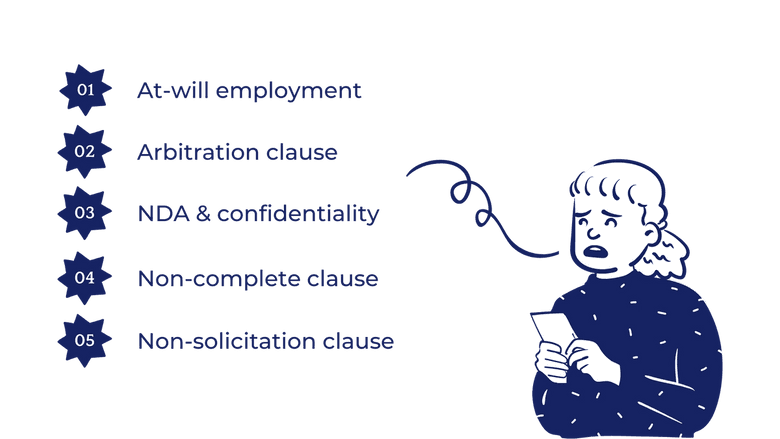Job Offer Letter Legal Terms to Look Out For
Carefully examine your offer letter before your sign to screen for pesky legal terms.
You finished the interview process, received a verbal offer, and your formal job offer letter has finally arrived.
As a potential employee, you're probably excited, nervous, and maybe a bit annoyed-- after all, you have to sift through a jargon-filled job offer before making a decision about your future career.
Before you sign anything, ask for a couple of days to read the employment agreement.
Examine the letter carefully and make sure it doesn't trigger any major questions or red flags. What should you be looking for in the first place? We'll break it down for you.
The Basics

These are the basic components of any job offer letter, and will likely be found near the beginning of the agreement. They are rarely cause for concern, however, they should be evaluated to ensure they meet your expectations.
Your Role
What does it include?
Most companies won't offer an in-depth job description in their offer letter, although it's not unheard of. Rather, you will likely see your job title, level, the company name, and the manager/supervisor you will report to.
Why should I pay attention to it?
Since these are the most basic components of an employment offer letter, they shouldn't require thorough scrutiny. Take a moment to make sure the elements are correct and consider browsing LinkedIn to learn about your prospective manager. If a more thorough job description is provided, look that over as well-- make sure you aren't agreeing to undertake any responsibilities you're uncomfortable with. If your responsibilities aren't clear, talk things over with your hiring manager before making any decisions.
Compensation Package
What does it include?
To put it simply, this is how you will be paid. It will include your starting salary (or hourly wage) and your pay period (i.e. how often you get paid). It may also outline any stock options, bonuses, relocation assistance, or special benefits that you negotiated. Employers will often include vacation time as well.
Why should I pay attention to it?
You want to make sure these elements meet your expectations, especially if a verbal discussion took place before you received a formal job offer letter. It's shockingly easy for miscommunications to occur between a recruiter and the human resources department, so it's possible that the numbers will be different than those you agreed upon.
Dates & Hours
What does it include?
This will include your start date and, if you're doing contact work, it may include an end date. Some companies also provide information about when your benefits kick in (i.e. health insurance, 401K, etc). It should also include your expected time commitment (i.e. part time, full time, etc), or even a specific work schedule, depending on the position.
Why should I pay attention to it?
It's important to understand your starting date for obvious reasons-- after all, you don't want to miss your first day!
If you're currently employed, it will also give you time to notify your employer of the career shift and get your affairs in order. If you have planned vacation time or other commitments, this is also your chance to negotiate a different start date, if necessary.
Beyond the start date, you should pay attention to dates & hours for the same reasons as compensation: to make sure they meet expectations and that you're comfortable with the job requirements.
The Legal Clauses

Upon first glance, these can be confusing, or maybe even a bit scary. These clauses and agreements are slightly less standard, and sometimes, they may be cause for concern. But don't worry-- with these tips, you'll know exactly what to look out for, and your job offer letter will be much easier to understand.
At-Will Employment
What does it mean?
This simply means that an employer is allowed to terminate you at any point, for any reason (with the exception of cases like discrimination). It also means that you, as an employee, are allowed to leave the company at any point, for any reason.
Why should I pay attention to it?
This clause is rarely cause for concern, rather, you want to make sure that it appears in your offer. Unless you are working under contract or have agreed to a predetermined length of employment, a company should not attempt to legally obligate you to stick around. If at-will is not part of your offer of employment, ask your recruiter or hiring manager (a) why, and (b) whether it can be added.
Arbitration Clause
What does it mean?
This clause stipulates that disputes between the employee and employer need to be settled by a third party, who will remain neutral throughout the process.
Why should I pay attention to it?
This may become an issue if you try to take your potential employer to court in the future, for whatever reason. Since this clause makes it difficult for lawsuits to become involved, it could prevent you from suing. If that's a risk you're willing to take, an arbitration clause shouldn't be of major concern. However, you may want to ask yourself why the employer included it in the first place.
Non Disclosure or Confidentiality Agreements
What does it mean?
It means that you must keep sensitive company information to yourself. If you fail to do so, you might face dire consequences, like termination or even a lawsuit.
Why should I pay attention to it?
If violated, these clauses can put your entire career at risk. Be sure to get a firm grasp on what's considered confidential. For example, do they only want client names to be omitted from discussions about your projects, or would you be prohibited from disclosing any details of your work? You should also understand what the consequences are for breaching confidentiality. Feel free to ask your potential employer and, if you don't trust yourself to keep things under wraps, consider keeping work out of your day-to-day conversations.
Non-Compete Clause
What does it mean?
This means that you agree not to work for any of the company's direct competitors, usually for one to two years after your employment is terminated.
Why should I pay attention to it?
Depending on the severity of the restrictions, it can limit your ability to get a new job somewhere down the road. If your industry is small, or the definition of "competitor" is broad, you may be blocked from working in your field for some time.
Freelance workers or those on short-term contacts should be particularly wary-- this clause could limit your ability to complete projects for companies in the same industry.
If it isn't clear, be sure to ask your employer which competitors are included within the definition. Additionally, clarify whether there are any other stipulations (Is it limited to the city you're in, or is it enforced nationally? Does it only apply when you're poached by a competitor, or does it even apply when you're fired?).
These criteria can help you assess the restrictions a non compete clause would present and whether becoming a new employee at this organization is worth the hassle.
Note: Non-competes vary widely by state. Not sure how it works in yours? Check out a chart of all 50 states here.
Non-Solicitation Clause
What does it mean?
This clause stipulates that you will not solicit your employer's customers or other employees, usually for one to two years after your employment is terminated.
Why should I pay attention to it?
If you would be in a role where bringing in business is part of your job description, and see yourself in a similar role down the road, this clause may be harmful.
Additionally, if you hope to one day start your own business, understand that you will not be able to leverage relationships you built at this company. There can be legal ramifications to violating a non-solicitation clause, and they aren't pleasant (hint: a lawsuit is usually involved).
If bringing in clients wouldn't be part of your role, this likely isn't something to be concerned about. In that case, however, it may be worth asking the employer why they included it.
Additional Information To Look For

Potential Clauses
Drug tests: Some employers require a drug screening during the background check, while others have them regularly. If there is a drug policy, it will likely be included somewhere in the offer letter or employment agreement. You should be aware of this if you take certain medications that may lead to false positives.
Probationary periods: These 60-90 day new hire "trial periods" can serve as an excuse for employers to withhold health benefits, terminate you easily, or operate under close scrutiny (and high pressure) for months on end. If a probationary period is included in your job offer, be sure to clarify the terms and implications. At the very least, try to ensure that you have healthcare and other essential benefits throughout your employee probation.
Proprietary information & inventions: If you would be entering a creative position at this company, keep an eye out for this clause. It states that anything you invent or create at the organization becomes their property. They may even ask you to list out your inventions that belong to other companies, to avoid confusion down the road. This one may be a bit trickier to negotiate....
Job Offer Letter Template
Finally, if you'd like a better idea of offer letter format, check out these (publicly available) job offer emails from top tech companies. They can be difficult to come by, but searching on popular tech blogs can reveal more insider information and job offer letter samples.
The information provided herein is for general informational purposes only and is not intended to provide tax, legal, or investment advice and should not be construed as an offer to sell, a solicitation of an offer to buy, or a recommendation of any security by Candor, its employees and affiliates, or any third-party. Any expressions of opinion or assumptions are for illustrative purposes only and are subject to change without notice. Past performance is not a guarantee of future results and the opinions presented herein should not be viewed as an indicator of future performance. Investing in securities involves risk. Loss of principal is possible.
Third-party data has been obtained from sources we believe to be reliable; however, its accuracy, completeness, or reliability cannot be guaranteed. Candor does not receive compensation to promote or discuss any particular Company; however, Candor, its employees and affiliates, and/or its clients may hold positions in securities of the Companies discussed.
